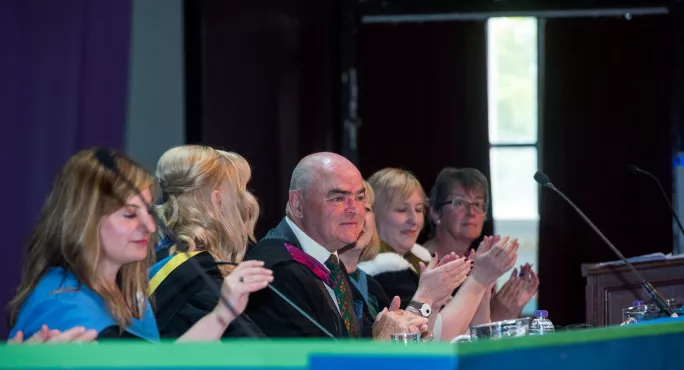Flanagan: focus on nursery teachers to close attainment gap

Nursery teachers are “fundamental” to closing the attainment gap, the outgoing general secretary of the EIS teaching union has said.
First minister Nicola Sturgeon has staked her legacy on significantly closing Scotland’s attainment gap, but has come under fire for failing to make enough progress.
In his final address to an EIS annual general meeting, after 10 years as general secretary, Larry Flanagan said it made “more sense to prevent the attainment gap establishing itself than to engage in a Sisyphus-like struggle to close it” - and that “securing the role of nursery teachers is the most fundamental step to achieving that”.
- More from EIS in week of its first full AGM since 2019
- The remote learning plans making waves in the Western Isles
- First full EIS meeting in three years - and a lot has changed
- Stress-related absence ‘taking over from Covid’ in schools
- Dundee teachers to strike over school faculty plans
- Strike action on cards if reduced contact time policy stalls
Mr Flanagan, speaking at the Caird Hall in Dundee this afternoon, said that he tried to “avoid being sucked into the party political Punch and Judy show” and instead to “work with all political parties and governments - Scottish and local”.
But there was one “singular failure of the Scottish government” that he did want to call out, and that was in the pre-5 sector.
“Shamefully, [the government] has facilitated the marginalisation of nursery teachers in pre-5, despite all the research evidence as to the efficacy of their role,” he said.
On senior-phase qualifications, Mr Flanagan said “it’s not been a progressive decade” and “frankly we are in a poorer position today than we were 10 years ago”, given the continued existence of a “high-stakes” exam system and “three-year treadmill” from S4-6 that is “inherently inequitable”.
He also said that believes “strongly in the empowerment agenda - it’s about teacher agency, professional autonomy”, but that for “teachers to be empowered, others have to give up power, and those others include the Scottish government, local authorities, educational agencies and even school management teams where collegiality is not the norm”.
The “top-down” approach of Dundee City Council to the controversial issue of school faculties - which as things stand will lead to strike action on Wednesday 22 June - is the very opposite of a commitment to empower teachers, Mr Flanagan said.
There were other signs of regression in the past 10 years: he had looked at his first general secretary address from a decade, which referred to one in 10 pupils living in poverty, but “shamefully, a decade later, we now have one in four living in poverty”.
But Mr Flanagan was more upbeat on the state of his union, which he described as being in “a stronger place than we were 10 years ago”. He said that, in the midst of a campaign for a 10 per cent pay rise for 2022-23, “come the autumn we will be strike-ready if required”.
He also said that there had been “really strong progress” in Scottish education during his 43-year career, in for example that there is now “an absolute consensus about the need to tackle the impact of poverty”. In 1979, in stark contrast, he said some pupils would be hived off into remedial classes for their entire time at school.
“I despair when I hear politicians talk about a halcyon past that we have fallen from - it didn’t exist, and frankly we need politicians to stop their constant bickering and lend Scotland’s teachers their full support,” said Mr Flanagan.
He said his replacement, Andrea Bradley, who takes over in August, will be “an absolutely brilliant general secretary”.
Mr Flanagan then left delegates with this upbeat message: “Teaching is a noble profession, and we should all be proud of our career choice. And despite all the challenges...I would make the same one again.”
Education secretary Shirley-Anne Somerville will address the EIS AGM later today.
Register with Tes and you can read two free articles every month plus you'll have access to our range of award-winning newsletters.
Keep reading with our special offer!
You’ve reached your limit of free articles this month.
- Unlimited access to all Tes magazine content
- Save your favourite articles and gift them to your colleagues
- Exclusive subscriber-only stories
- Over 200,000 archived articles
- Unlimited access to all Tes magazine content
- Save your favourite articles and gift them to your colleagues
- Exclusive subscriber-only stories
- Over 200,000 archived articles
topics in this article



